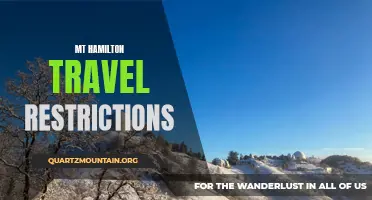
Are you planning a trip to Bolivia? From its stunning landscapes to its vibrant culture and rich history, this South American gem offers endless opportunities for adventure. But before you set off on your unforgettable journey, it's crucial to pack the right essentials. In this article, we will guide you through what to pack for a trip to Bolivia, ensuring you have everything you need to make the most out of your experience in this incredible country. So grab your suitcase, and let's get started on preparing for your Bolivian adventure!
What You'll Learn
- What are the essential items to pack for a trip to Bolivia?
- Are there any specific clothing items or gear that are recommended for exploring Bolivia's diverse landscapes?
- What are some important documents or travel essentials to pack for a trip to Bolivia?
- Are there any specific medications or vaccinations recommended for traveling to Bolivia?
- How can I best prepare for the high altitude in certain areas of Bolivia?

What are the essential items to pack for a trip to Bolivia?

When planning a trip to Bolivia, it's important to pack the essentials to ensure you have a comfortable and enjoyable experience. Whether you're exploring the salt flats of Uyuni, hiking in the Andes, or delving into the vibrant culture of La Paz, having the right items on hand can make all the difference. Here are some essential items to consider packing for your trip to Bolivia:
Travel documents:
- Passport: Ensure that your passport is valid for at least six months beyond your planned departure date.
- Bolivian visa: Check the visa requirements for your country of residence and obtain the necessary visa before travel.
- Photocopies and digital copies: Make copies of your passport, visa, and other important travel documents. Store them in separate locations, including electronically, as a backup.
Clothing:
- Layered clothing: Bolivia's weather can vary greatly, especially in the mountains. Pack layers so you can adjust to fluctuating temperatures throughout the day.
- Warm jacket or fleece: Even in the warmer months, evenings in the mountains can get chilly.
- Rain jacket: Bolivia's rainy season runs from November to March, so a waterproof jacket is essential for staying dry.
- Comfortable walking shoes: You'll likely be doing a lot of walking and hiking, so pack sturdy, comfortable shoes.
- Hat and sunglasses: Protect yourself from the strong sun at high altitudes.
Medications and personal care:
- Altitude sickness medication: Bolivia's high altitude can take a toll on your body. Consult with your doctor and pack any necessary medications to combat altitude sickness.
- Insect repellent: Depending on the areas you plan to visit, insects may be prevalent. Pack a reliable insect repellent to protect yourself from bites.
- Sunscreen: The higher altitude means the sun's rays are stronger. Use a high SPF sunscreen to protect your skin.
- Personal care items: Don't forget your toiletries, including toothbrush, toothpaste, and any other personal care essentials.
Electronics and gadgets:
- Camera: Bolivia's stunning landscapes and vibrant culture provide ample photo opportunities. Bring a camera with extra batteries and memory cards to capture your adventure.
- Power adapter: Bolivia uses type A and type C electrical outlets, so check if you need a power adapter to charge your devices.
- Portable charger: To ensure you have a power source while on the go, pack a portable charger for your phone or other electronic devices.
Money and safety:
- Cash and cards: While many places accept credit cards, it's a good idea to have some cash on hand for smaller establishments and emergencies.
- Travel insurance: Protect yourself against unforeseen circumstances by having travel insurance that covers medical expenses, trip cancellations, and lost or stolen belongings.
By packing these essential items, you'll be well-prepared for your trip to Bolivia. Remember to also research the specific regions you plan to visit, as the climate and terrain can vary across the country. With the right gear and documents, you'll be able to fully immerse yourself in Bolivia's diverse landscapes, rich history, and vibrant culture.
Essential Items for Packing a Travel List to Italy
You may want to see also

Are there any specific clothing items or gear that are recommended for exploring Bolivia's diverse landscapes?

When it comes to exploring the diverse landscapes of Bolivia, it is important to be well-prepared with the right clothing and gear. The varied terrain and weather conditions in Bolivia call for specific clothing items and gear that can help you navigate through different environments comfortably and safely. Here are some recommendations for what to wear and what gear to bring when exploring Bolivia's diverse landscapes.
- Layers: Bolivia experiences a wide range of temperatures throughout the day due to its altitude variations. It is essential to dress in layers to adjust to the changing weather conditions. Start with a moisture-wicking base layer to keep you dry and comfortable. A mid-layer, such as a fleece jacket or a down vest, provides insulation. Finally, pack a waterproof and windproof outer layer to protect yourself from rain and strong winds.
- Hiking Boots: Having a sturdy pair of hiking boots is crucial for exploring Bolivia's diverse landscapes. The varied terrains, including mountains, jungles, and deserts, require footwear with excellent traction and ankle support. Opt for waterproof boots to keep your feet dry during rainy hikes or stream crossings.
- Sun Protection: Bolivia is known for its high-altitude cities like La Paz and the famous Uyuni Salt Flats. At higher altitudes, the sun's UV rays are stronger, increasing the risk of sunburns and sun damage. Pack a wide-brimmed hat, sunglasses with UV protection, and sunscreen with a high SPF to shield yourself from the sun's harmful rays.
- Rain Gear: Bolivia experiences a wet season, particularly in the Amazon rainforest regions. When exploring these areas, it is important to have reliable rain gear, including a waterproof jacket and pants. This will keep you dry and comfortable during unexpected rain showers and protect your other layers from getting soaked.
- Insect Repellent: Bolivia is home to a diverse range of insect species, including mosquitoes and sandflies that can transmit diseases such as malaria and dengue fever. Apply a DEET-based insect repellent to exposed skin to reduce the risk of insect bites. Additionally, consider bringing a mosquito net for areas with a higher concentration of insects, such as the Amazon rainforest.
- Daypack: A good quality daypack is essential when exploring Bolivia's diverse landscapes. Choose a pack with comfortable shoulder straps and back support to distribute weight evenly and prevent back strain. Your daypack should be spacious enough to carry essential items like water, snacks, a map, a compass, a first aid kit, and extra layers of clothing.
- Water Bottle: Staying hydrated is crucial when exploring Bolivia's diverse landscapes. Carry a reusable water bottle and refill it whenever possible, especially during long hikes or when venturing into remote areas. Consider using a water purifier or water purification tablets to ensure you have access to clean drinking water.
- Navigation Tools: Depending on the type of exploration you plan to do, it may be necessary to bring navigation tools such as a map, compass, and a GPS device. These tools will help you stay on track and navigate Bolivia's diverse landscapes with confidence.
Remember, the specific clothing items and gear you need will vary depending on the places you plan to visit and the activities you will be engaging in. It is always recommended to research the region you are exploring and consult with local experts or travel guides for the most accurate advice. By being prepared with the right clothing and gear, you can fully enjoy and safely explore Bolivia's diverse landscapes.
The Best Materials for Effective Wound Packing: A Comprehensive Guide
You may want to see also

What are some important documents or travel essentials to pack for a trip to Bolivia?

Traveling to Bolivia can be an exciting adventure, but it's important to ensure you have all the necessary documents and essentials for a smooth and hassle-free trip. Whether you're planning a visit to the bustling city of La Paz, exploring the awe-inspiring landscape of the Uyuni Salt Flats, or immersing yourself in the vibrant culture of the indigenous communities, here are some important items you shouldn't leave behind:
- Passport: Your passport is the most important document when traveling internationally. Ensure it is valid for at least six months beyond your planned departure date from Bolivia. Make copies of your passport and keep them in a separate location, or scan them and store them securely online.
- Bolivian Visa: Depending on your nationality, you may require a visa to enter Bolivia. Check the visa requirements well in advance and apply accordingly. Some nationalities can obtain a visa upon arrival, while others may need to apply in advance at the nearest Bolivian embassy or consulate.
- Flight and Accommodation Details: Print out your flight itinerary and any hotel or hostel bookings. These documents may be required for immigration checkpoints or when checking into your accommodation.
- Travel Insurance: It is highly recommended to have travel insurance that covers medical expenses, trip cancellation, and lost or stolen belongings. Make sure to carry a copy of your insurance policy and emergency contact numbers.
- Vaccination Certificates: Check if any specific vaccinations are recommended or required for traveling to Bolivia. Carry your vaccination certificates, especially for yellow fever, as some regions in Bolivia are at risk for this disease.
- Money and Bank Cards: Bolivia's currency is the Boliviano (BOB). While major credit and debit cards are accepted in larger cities, it's advisable to have some cash for smaller establishments and for emergencies. Inform your bank about your travel plans to avoid any issues with your cards.
- Electronic Gadgets and Chargers: Bolivia uses 220-volt electricity, so make sure you have the right adapters or converters for your electronic devices. Consider bringing a power bank to charge your devices on the go, as electricity supply can be unreliable in some areas.
- Weather-Appropriate Clothing: Bolivia's climate varies greatly depending on the region and altitude. Pack a combination of lightweight and warm clothing, as temperatures can drop significantly, especially during the evenings. Don't forget a good pair of hiking shoes for exploring the diverse landscapes.
- Medications and First Aid Kit: If you take any prescription medications, ensure you have an adequate supply for the duration of your trip. It's also advisable to carry a basic first aid kit with essentials like band-aids, antiseptic cream, pain relievers, and any other medications you may need.
- Guidebooks and Maps: While smartphones and GPS are handy, having a physical guidebook or map can be useful, especially in remote areas with limited internet connectivity. They can provide valuable information about popular attractions, local customs, and transportation options.
Remember to check the current travel advisories for Bolivia before departing. Stay informed about any political or social unrest, natural disasters, or health warnings that may affect your travel plans. With proper preparation and the right documents and essentials, your trip to Bolivia will be a memorable and enjoyable experience.
What to Pack for an Exciting Explorica Adventure
You may want to see also

Are there any specific medications or vaccinations recommended for traveling to Bolivia?

If you are planning a trip to Bolivia, it is important to consider any potential health risks and take steps to protect yourself before you go. While Bolivia is a beautiful and diverse country with many attractions to offer, it is also important to be aware of the health hazards that can be present in certain areas.
Before traveling to Bolivia, it is recommended to visit a travel healthcare provider or a travel clinic to receive the necessary vaccinations and medications. These healthcare providers specialize in travel medicine and can provide you with the most up-to-date and accurate information regarding your specific travel plans.
The routine vaccinations that are recommended for all travelers include measles-mumps-rubella (MMR) vaccine, diphtheria-tetanus-pertussis vaccine, varicella (chickenpox) vaccine, polio vaccine, and flu shot. These vaccinations are important for protecting yourself against common diseases that can be present in any country, including Bolivia.
In addition to routine vaccinations, there are certain vaccinations that are specifically recommended for travel to Bolivia. These include the Hepatitis A vaccine, Typhoid vaccine, and Yellow Fever vaccine. Hepatitis A is a viral infection that can be spread through contaminated food and water, and Typhoid is a bacterial infection that is also transmitted through contaminated food and water. Yellow Fever is a viral infection that is transmitted through mosquito bites and is present in certain areas of Bolivia. Depending on your itinerary and planned activities, you may also need additional vaccinations such as Rabies, Hepatitis B, and Meningitis vaccines.
It is also important to take preventive measures to avoid mosquito bites while in Bolivia. This includes using insect repellents, wearing long-sleeved shirts and long pants, and staying in accommodations with screened windows and doors. Mosquito-borne diseases such as Dengue fever and Zika virus can be a risk in certain regions, so it is important to take precautions to protect yourself.
In addition to vaccinations, there are certain medications that may be recommended for travel to Bolivia. This includes anti-malarial medications for areas where malaria is present. It is important to consult with a healthcare provider to determine the specific medication and dosage that is appropriate for your travel plans, as different regions of Bolivia may have varying levels of malaria risk.
In conclusion, if you are planning a trip to Bolivia, it is important to take the necessary precautions to protect yourself against potential health risks. This includes visiting a travel healthcare provider or travel clinic to receive the recommended vaccinations and medications. By taking these steps, you can help ensure a safe and healthy trip to Bolivia.
Essential Items for a Well-Packed Wildland Fire Pack
You may want to see also

How can I best prepare for the high altitude in certain areas of Bolivia?

Bolivia is known for its breathtaking high altitude landscapes, ranging from the famous Salar de Uyuni to the stunning peaks of the Andes. However, the high altitude in certain areas of Bolivia can be challenging for visitors, especially those who are not accustomed to such conditions. Altitude sickness, also known as acute mountain sickness (AMS), is a common concern for travelers. Luckily, there are steps you can take to prepare yourself for the high altitude in Bolivia and ensure a safe and enjoyable trip.
- Gradual acclimatization: The most important step in preparing for high altitude is to acclimatize gradually. This means giving your body time to adjust to the lower levels of oxygen in the air. It is recommended to spend a few days in a lower altitude city, such as La Paz (3,650 meters above sea level), before heading to higher altitude destinations like Potosí (4,067 meters above sea level) or the Uyuni Salt Flats (3,656 meters above sea level). This will help your body slowly adapt and reduce the chances of experiencing altitude sickness.
- Stay hydrated: Staying adequately hydrated is crucial when dealing with high altitude. The dry mountain air can cause increased fluid loss from your body, leading to dehydration. Drink plenty of water and avoid alcohol and caffeine, as they can further dehydrate you. It's a good idea to carry a water bottle with you at all times and sip on it frequently.
- Avoid strenuous activities: At high altitude, physical exertion can be much more challenging. Take it easy during the first few days of your trip and avoid strenuous activities. Allow your body time to adjust and avoid pushing yourself too hard. Take frequent breaks and listen to your body's signals. If you start feeling lightheaded or short of breath, rest and give yourself time to recover.
- Consider medication: If you are particularly prone to altitude sickness or are concerned about its potential impact on your trip, you may want to talk to your doctor about medication options. Acetazolamide is one commonly prescribed medication that can help prevent or alleviate the symptoms of altitude sickness. However, it is important to consult with a healthcare professional before taking any medication.
- Eat a healthy diet: Maintaining a healthy diet is important for overall well-being, but it can also support your body during high altitude travel. Eat foods rich in carbohydrates, as they can provide an extra source of energy at higher altitudes. Include plenty of fruits and vegetables in your diet to ensure you are getting essential vitamins and minerals. Avoid heavy, greasy meals that can make digestion more difficult at altitude.
- Listen to locals and take their advice: Locals in high altitude areas of Bolivia have a wealth of knowledge and experience when it comes to dealing with the challenges of living at high altitudes. Listen to their advice and follow their recommendations. They can provide valuable insights on how to stay safe and healthy, as they have adapted to the conditions over time.
In conclusion, preparing for the high altitude in certain areas of Bolivia involves gradual acclimatization, staying hydrated, avoiding strenuous activities, considering medication if necessary, eating a healthy diet, and listening to locals. By taking these steps, you can minimize the risk of altitude sickness and ensure a memorable and enjoyable trip to the stunning landscapes of Bolivia.
The Essential Checklist for Packing for Your Holiday Vacation
You may want to see also
Frequently asked questions
When packing for a trip to Bolivia, it is important to consider the climate and altitude. In high-altitude areas like La Paz and the Andes, temperatures can drop significantly, so it is crucial to pack warm clothing such as thermal layers, jackets, gloves, and hats. In lower altitude regions like Santa Cruz or Sucre, the temperatures can be milder, so pack a mix of warm and lightweight clothing. Don't forget to pack comfortable walking shoes, a hat for sun protection, and a good pair of sunglasses.
Yes, it is essential to bring a power adapter for Bolivia. The country uses Type A and Type C electrical outlets, which have two flat pins or a combination of two round pins. If your devices have different plug types, make sure to bring an appropriate adapter to ensure you can charge your electronics. It is also a good idea to bring a portable power bank in case you need to charge your devices on-the-go.
In addition to clothing and adapters, there are a few other essential items you should pack for a trip to Bolivia. First, make sure to have a valid passport and any necessary visas. It is also recommended to bring a photocopy of your passport in case of loss or theft. Other important items include a good quality travel insurance policy, insect repellent, sunscreen, and a basic medical kit for any minor injuries or illnesses.
When visiting the Salt Flats in Bolivia, there are some specific items you should pack. Due to the extreme sunlight and reflective nature of the salt, it is crucial to have proper sun protection. Bring a wide-brimmed hat, sunglasses with UV protection, and a high SPF sunscreen. It is also recommended to have a good camera or smartphone with extra batteries and memory cards to capture the stunning landscapes. Additionally, pack a reusable water bottle, as it is important to stay hydrated in the dry and high-altitude conditions.







